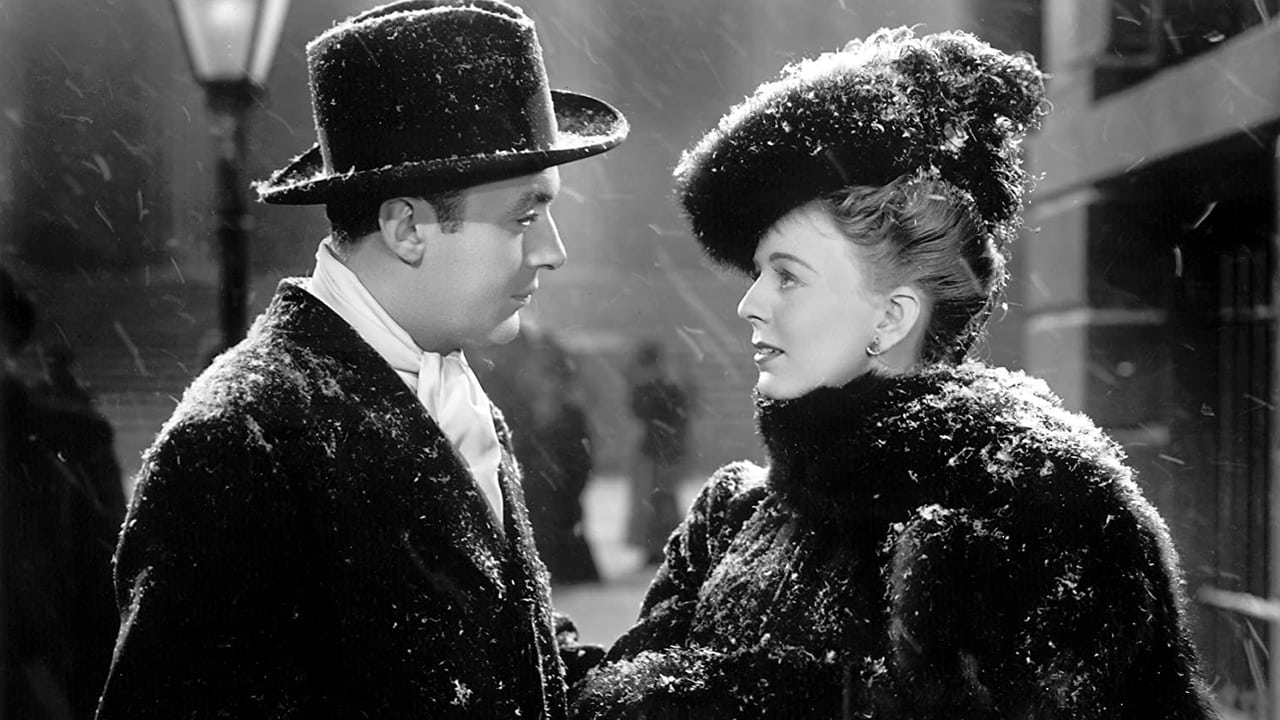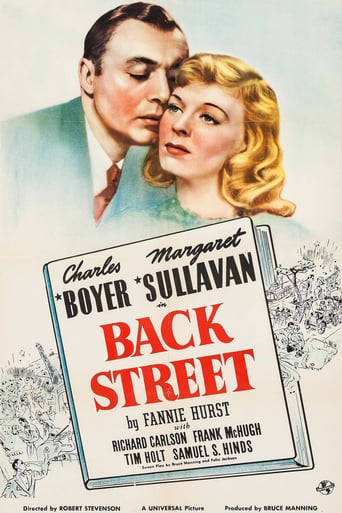

just watch it!
... View MoreThere's a more than satisfactory amount of boom-boom in the movie's trim running time.
... View MoreIt's the kind of movie you'll want to see a second time with someone who hasn't seen it yet, to remember what it was like to watch it for the first time.
... View MoreMostly, the movie is committed to the value of a good time.
... View Morea moment. and its significance. love. and its force who change everything. and the need to respect the rules. one of the films who gives more than the flavor of old fashion cinema. but good performances, seductive - dramatic story, the bitter perspective about chance, choices and sacrifice, the opportunity to come back to a broken dream and the moral lesson who remains the perfect end. a love story who becomes game of memories. at the first sigh, this is all. but only the top of the iceberg. because Charles Boyer seems be perfect as the man looking for the true love. and he has the great gift to be part of beautiful cast who gives to story brilliance and profound roots.
... View MoreThis is the second of the thrice filmed Fanny Hurst novel about the other woman. Tastefully directed and lensed by Robert Stephenson and Charles Daniels and featuring standout performances from Charles Boyer and Margaret Sullavan it is probably the best of the bunch. Traveling salesman Walter Saxel and free spirit Ray Smith meet through an acquaintance and in the course of an evening become strongly attracted to each other. He is engaged but makes a decision to marry her on board a river boat. She unfortunately misses the boat and Saxel doesn't see her for another five years marrying in the meantime. They rekindle and she becomes his mistress. As he grows in fame and fortune she remains in the shadow for decades until his children confront her.Boyer and Sullavan as the long time lovers display a wonderful chemistry with each other. Sullavan's husky voice and Boyer's suave inflection reinforced by telling glances unite the two in an odd but perfect romantic match. Richard Carlson as a well intentioned suitor is also well cast and Frank McHugh, allowed to stretch, shines as Ray's loyal friend with an eternal crush.Director Stephenson does an excellent job of keeping mood subdued without resorting to hysterics to bring life to the story. His adults behaving like adults expressing and suppressing their feelings in a tempered but passionate way gives the film a graceful tension. Cinematographer Charles Daniels turns in his usual array of impeccably lit compositions such as an evening snowfall where Ray and Walter meet for the first time in five years and the powerful final moments that he along with Stephens jarring and effectively de-romanticizes with stunning portraiture that evokes Goya.
... View MoreBACK STREET (Universal, 1941), directed by Robert Stevenson, is one of the finer love stories from the "soap opera" school that owes its success to the popular 1931 novel authored by Fannie Hurst. Initially produced by Universal in 1932 starring Irene Dunne and John Boles, this latest edition not only improves in style and performance from the earlier tearjerker, but simply indicates how "great movies are not made, they're remade." Usually whenever an original product gets redone, comparisons are usually made. There's no question that the Dunne and Boles romancer proved highly successful, but in contrast, this edition benefits greatly by its fine scripting by Bruce Manning and Felix Jackson, believable performances by Charles Boyer and Margaret Sullavan, and most of all, its impressive and sensitive scoring by Frank Skinner.Following the same pattern to the original, with few alterations along the way, the story gets underway in "Cincinnati, at the turn of the century" where Ray Smith (Margaret Sullavan) parades down the street with Curt Stanton (Richard Carlson), owner of a bicycle shop who later becomes an automobile manufacturer in Michigan. While Curt loves Ray and hopes to marry her, she very much prefers her carefree lifestyle and the company of various male suitors, especially Eddie Porter (Frank McHugh), a traveling salesman. While Ray bids Eddie farewell at the train station, he introduces her to Walter Louis Saxel (Charles Boyer), a Louisiana Frenchman and prominent New York banker arriving on a short stay before leaving on the next ferryboat. Not only do Ray and Walter become better acquainted within a few hours, but fall deeply in love. Having remained in town longer than expected, Walter makes arrangements to leave. Before he does, he confesses his engagement to marry and that they will never see each other again. The following morning, however, Walter, who cannot forget Ray, telephones her to meet him at the dock. Before her arrival, Walter makes preparations for a surprise wedding that's to take place on the boat between him and Ray. As Ray closes shop to meet Walter, situations occur preventing her from arriving at all. By the time she does gets there, she finds Walter gone and the ferryboat slowly disappearing from view. Five years pass. Ray, now a clothing designer in New York City, meets Walter again, now a prominent banker. Regardless of Walter now a married man with a son, the couple find they cannot live without each other. For the next 25 years (with its final chapter set in 1928), Ray lives the "back street" of Walter's life, passing herself off to others as his wife, Mrs. Raymond Smith. Problems take its toll as the middle-aged Ray is confronted by Walter's two grown children (Tim Holt and Nell O'Day). Having known of their father's illicit affair, they make ever effort of doing something about it.The basic premise to BACK STREET is "what if?" What if Ray were able to meet Walter at the dock and marry him as planned. Would their lives have been happier? Possibly so. Had it worked out that way, then there wouldn't have been the classic story of complications as we know it. Essentially a Sullavan film, it is Boyer whose name heads the cast of such notables as Esther Dale (Mrs. Smith, Ray's stepmother); Kitty O'Neil (Mrs. Dilling, the kindly landlady); Frank Jenks (Harry Niles); Samuel S. Hinds (Felix Darren); Nella Walker (Corinne Saxel, Walter's wife); Peggy Stewart (Freda, Ray's sister); Cecil Cunningham (Mrs. Miller) and Marjorie Gateson (Mrs. Adams). There's also surprise casting of cowboy actor Tim Holt playing Boyer's son, and a more or less straight performance by funster, Frank McHugh.Boyer, the romantic, is no stranger to motion picture love stories, with LOVE AFFAIR (RKO Radio, 1939) opposite Irene Dunne, being one of his best portrayals. However, his Walter Saxel is less sympathetic due to his selfishness for keeping both wife and mistress, and the way he takes Ray for granted. One such scene is evident as Walter spends an entire summer vacationing in Europe with his wife, with Ray waiting alone in her apartment for his letters that never come. Upon his return, days after the boat docks, Walter, without considering Ray's feelings, presents the news he's a father again. Ray, on the other hand, is strong willed except when it comes to Walter. Comparing the climatic showdown between father and son in both 1932 and 1941 editions, the soft-spoken Boles, best suited for faithful husband roles, presents himself as weak while Boyer's strong voice and forceful manner, especially when telling his son to mind his own business, is truly felt. Irene Dunne (Ray Schmidt) and Margaret Sullavan (Ray Smith), two different screen personalities, form their own interpretation of the same heroine, which works well on both levels for their performances.BACK STREET proved favorable viewing with its frequent TV broadcasts throughout much of the 1970s, especially on WOR, Channel 9's "Million Dollar Movie" in New York City. In an August 1975 showing, BACK STREET was given a special broadcast without commercial interruptions. Interestingly, however, only the third retelling of the story, the 1961 modern-dress/ Technicolor version starring Susan Hayward and John Gavin was made available onto home video in the 1990s. In 2011, both 1941 and 1961 versions to BACK STREET have become available on DVD package through Turner Home Entertainment. A pity there wasn't a triple feature using all three editions to the Fanny Hurst tearjerker. Cable television history to 1941's BACK STREET consisted that of American Movie Classics (1990-1998), sometimes on the double bill with the 1932 original, and Turner Classic Movie (TCM premiere July 19, 2001.) While Boyer and Sullavan worked together again, this time in a comedy titled APPOINTMENT FOR LOVE (Universal, 1941), it's this version of BACK STREET for which they will be remembered best. (***)
... View More"This film (based on a Fanny Hurst best seller) is way out of date in the modern age. No self-respecting woman would be so willing to sacrifice her career for the prospect of being a millionaire's kept woman. No man, seriously in love with any woman, would put them through such a demeaning situation (they would consider divorce first of all, then remarriage). But there was supposed to be a sense of self-sacrifice by the heroine (Margaret Sullivan) that transcended the entire story."The point is, this film isn't set in the modern age. There's no sense judging this or any other movie set in another era by today's standards. At the time this story took place, divorce wasn't common. In fact, it was still considered scandalous. Many women put up with unhappy, even abusive marriages, rather than incur the wrath of society that a divorce would have brought upon them. Also, regardless of what her career prospects may have been, a man's career always took precedence. There's no way that he would have sacrificed his family and his career in order to divorce his wife and marry his mistress. There's no way she would have asked him to. This was made very clear in a conversation that took place between them. When you watch a movie set in another time you need to keep in mind that the rules that governed society are most likely far different than the ones we have today. You need to judge it by those rules or not at all.
... View More